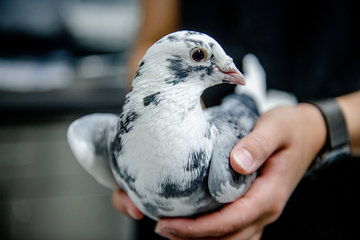Babies with an accent
Newborns cry differently depending on their mother tongue
In the first days of their lives, French infants already cry in a different way to German babies. This was the result of a study by researchers from the Max Planck Institute for Human Cognitive and Brain Sciences in Leipzig, the Centre for Pre-language Development and Developmental Disorders (ZVES) at the University Clinic Würzburg, and the Laboratory of Cognitive Sciences and Linguistics at the Ecole Normale Supérieure in Paris. In this study, the scientists compared recordings of 30 French and 30 German infants aged between two and five days old. While the French newborns more frequently produced rising crying tones, German babies cried with falling intonation. The reason for this is presumably the differing intonation patterns in the two languages, which are already perceived in the uterus and are later reproduced. (Current Biology, November 5th, 2009)

In the last trimester of the pregnancy, human fetuses become active listeners. "The sense of hearing is the first sensory system that develops", says Angela Friederici, one of the Directors at the Max Planck Institute. "The mother’s voice, in particular, is sensed early on." However, the fetus’ hearing in the uterus is restricted due to the amniotic fluid. "What gets through are primarily the melodies and intonation of the respective language". In previous work, Professor Friederici’s research team found evidence that the intonation patterns of the respective mother tongue are already ingrained in the brains of four-month-old babies.
Especially large differences exist between spoken German and French. "In French, a lot of words have stress at the end, so that the intonation rises, while in German, it is mostly the opposite", Friederici explains. The word "papa" is pronounced "papa" in French and "papa" in German, for example. Until now it was believed unlikely that this had an influence on newborns' cries as it was assumed that their "crying melody" was influenced by the building up and falling of breath pressure, as in baby chimpanzees, and not by mental representations in the brain. A misassumption, as the analysis of more than 20 hours of babies’ crying from German and French maternity wards shows. The analysis of crying conducted under the supervision of the psychologist Kathleen Wermke from the ZWES showed that the newborns tended to produce the intonation pattern most typical for their respective mother tongue. The crying patterns of the German infants mostly began loud and high and followed a falling curve while the French infants more often cried with a rising tone. This early sensitivity to features of intonation may later help the infants learn their mother tongue, the researchers say. "When they begin to form their first sounds, they can build on melodic patterns that are already familiar and, in this way, don’t have to start from scratch", says the neuropsychologist. The evolutionary roots of this behaviour are older than the emergence of spoken language, the researchers believe. "The imitation of melodic patterns developed over millions of years and contributes to the mother-child bond" says Friederici.












